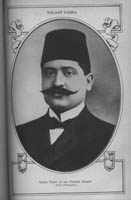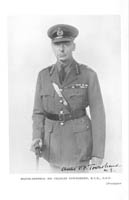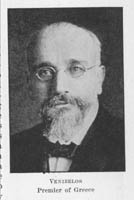Table of Contents
Key Figures
Statesmen
a | b | c | d-e | f | g | h-i | j-l | m | n-o | p | r | s | t-v | w-y
Mehmet Talaat Pasha (1874-1921)
A Turkish statesman, Talaat was first arrested for subversive activity against the Ottoman government in 1893. He became a leading member of the Young Turks and participated actively in the Revolution of 1908. Talaat received an appointment to serve as a deputy for Edirne in the Turkish Parliament. In 1909, Talaat joined the national cabinet as the Minister of the Interior and later as the Minister of Post. He expanded his power within the party when he was elected Secretary General of the Committee of Union and Progress in 1912. Unlike most of the Young Turk leaders, Talaat supported working with the British and French before World War I. When the Entente Powers rejected his overtures, he sided with Enver Pasha in establishing an alliance with Germany. Talaat did not support Turkey's entry into the war in November 1914 because he viewed the conflict as a major gamble which would not come out favorably for the empire. As the Minister of the Interior, Talaat was responsible for subordinating the Ottoman population to support the war effort. His office oversaw the deportation of the Armenians from the eastern provinces to Syria and Mesopotamia starting in April 1915, after the rebel's capture of Van. Ottoman officials feared a general Armenian uprising which would support the Russian offensive from the Caucasus. As a result of this forced migration, over 600,000 Armenians died during the "Atrocities." This program was the first example of genocide in the 20th century. Talaat denied knowledge or involvement in the implementation of this policy. In February 1917, Talaat became the Grand Vizier and held this post until his resignation in October 1918, prior to the signing of the Turkish Armistice. Talaat fled with Enver Pasha and Djemal Pasha on board a German ship to Germany. He was assassinated in Berlin in April 1921 in an act of revenge by an Armenian.
Graf Taube
A count and Swedish Ambassador to Germany during World War I, Graf Taube looked after the interests of several Allied countries. In April 1916, Taube became an honorary member of the German YMCA War Prisoners' Aid Committee, established by Archibald C. Harte in Berlin. This organization oversaw WPA operations in the German Empire and became a model for WPA relief services in other countries.
Carl Taylor
A lieutenant colonel in the U.S. Army, Taylor commanded a special commission of fifty American Red Cross personnel who arrived in Berlin in February 1919 to provide medical assistance to the 400,000 Russian prisoners of war still incarcerated in Germany. With the collapse of the imperial government, conditions in the prison camps deteriorated quickly. The Red Cross workers conducted inspections of seventy-five prison camps which housed Russian prisoners and developed an inventory of food supplies, clothing and equipment needs, sanitary arrangements, and recreation opportunities. The American Red Cross gained access to the supplies originally earmarked for American, British, and French POW's in Germany, but who had long since departed. Once the food supply system at the prison camps was reestablished, the Red Cross provided clothing, medical and hospital supplies, and special food for sick Russian prisoners.
Charles V. F. Townshend (1861-1924)
A British major general, Townshend served in the Sudan Expedition of 1884 to 1885. He distinguished himself by holding the Chitral fort in India in 1895 and he fought in the Boer War. By 1911, he had risen to the rank of major general. With the Turkish entry into the Great War in November 1914, the British High Command assigned Townshend to command British forces in Kuwait. Launching an offensive from Basra, Townshend led a British expedition up the Tigris River in Mesopotamia and drove the Turks out of Al Qurna in December 1914. He continued the advance northward, seizing Amara in June and Kut-al-Amara in September 1915. Townshend had almost reached Baghdad when the British encountered a superior Turkish force at Ctesiphon in November. Checked by the Turks, Townshend ordered a retreat to Kut-al-Amara, reaching the city by December 1915. The Turks enveloped the city and defeated British attempts to raise the siege. At the end of April 1916, the surviving British and Indian forces in Kut surrendered. The capitulation was a major British defeat, which buoyed the spirit of the Turkish Army. The Turks forced the Anglo-Indian prisoners of war to march across the desert without adequate food, water, shelter, or medical attention and large numbers of POW's died under terrible conditions before reaching prison camps in Anatolia. Townshend became an honored prisoner of war in Constantinople and the Turkish government negotiated through Townshend in October 1918 to accept the Allied armistice terms.
Field Marshal Lieutenant Urban
An Austrian general, Field Marshal Lieutenant Urban supervised prisoner of war operations for the Austro-Hungarian Ministry of War during World War I. In May 1915, Archibald Harte visited Vienna to seek Association access to Dual Monarchy prison camps to establish War Prisoners' Aid operations. Flushed with success in Germany, Harte found a ready audience in Vienna. Urban informed U.S. Ambassador Frederic Penfield that the Ministry of War approved Harte's proposal to allow American YMCA secretaries to begin WPA service on the condition that similar operations be established for Austro-Hungarian prisoners of war in Russia and Serbia. Utilizing the Principle of Reciprocity, Harte traveled to Russia and obtained permission for the Association to undertake WPA operations in the tsarist empire. Urban granted the American YMCA permission to start POW relief operations by constructing Association halls in Braunau-in-Böhmen in Austria and Sopronnyek in Hungary in May 1915.
Eleutherios Venizelos (1864-1936)
A Greek statesman, Venizelos was born on Crete. The government called him to Athens in 1909 as a political advisor and Venizelos negotiated a settlement between King Constantine I and opposition leaders. In October 1910, Venizelos became the Premier of Greece. He instituted an aggressive foreign policy and was the prime mover behind the establishment of the Balkan League in 1912. Greece, Serbia, and Bulgaria defeated the Ottoman Empire in the First Balkan War, which lasted from 1912 to 1913, reducing Turkey in Europe to a sliver of territory in eastern Thrace. Venizelos then formed the alliance of Greece, Serbia, Romania, and Turkey against Bulgaria in the Second Balkan War of 1913. When World War I broke out, Venizelos vigorously supported the Allied powers. When pro-German King Constantine denounced Venizelos, the premier resigned in March 1915. With the support of Pavlos Koundouriotes, Venizelos formed a Provisional Government of National Defense at Salonika in 1916, which received official recognition from the Allied governments. Venizelos forced the abdication of Constantine in June 1917 and formed a new government in Athens. Greece then declared war against Germany, Austria-Hungary, and Bulgaria. Venizelos represented Greece at the Versailles Peace Conference in 1919 and convinced the Allies to establish a Greek sphere of influence in Turkey based in Smyrna in Anatolia. This occupation led to a war between Greece and Turkey and the Greek defeat resulted in the transfer of millions of refugees between the two countries. Venizelos resigned the premiership in November 1920, but returned to power for a short time in 1924. He advocated the establishment of a republic, which the Greeks approved in a national plebiscite in April 1924. Venizelos became premier again from 1928 to 1932 and in 1933. He became the leader of the opposition to the Tsaldares government, beginning in 1933, and Venizelos attempted an unsuccessful military and naval revolt in March 1935. His failure resulted in his flight into exile. While abroad, the Greek military court-martialed Venizelos and condemned him to death. Upon the return to the throne of King George II in November 1935, the king granted Venizelos amnesty.


